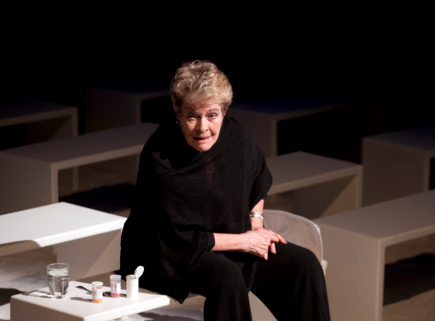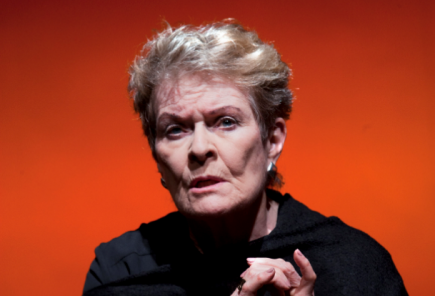Oscar-nominated actress, Dame Janet Suzman, delivers a poignantly hypnotic performance as Rose, the eponymous character in HOME’s timely revival of Martin Sherman’s 1999 play of the same name.
Rose is a solo tour-de-force. From the moment she appears immersed in a narrow halo of white light on an otherwise darkened stage, Suzman possesses the character with such vigour and authenticity that you discover yourself drawn into the shadowy chasms of her memory.
Rose is a one-actor performance and Suzman effortlessly seizes your attention from the get-go only to release her grip once she has unburdened Rose’s tortured soul.
Alone on an empty stage, Rose begins her story. It is the story of one woman’s struggle to survive the atrocities of the Second World War. The story of a Jewish refugee desperately seeking a place to belong, whether in the biblical holy land of Palestine or the newly appointed promised land of America.
This is Rose’s story but it speaks volubly for the invisible multitudes who suffered similar fates in the Europe of the 1940s, and for those who continue to seek shelter and mercy in our unified Europe of today.
Rose revisits her earliest memories of a relatively happy childhood in the impoverished shtetls (rural Jewish villages) of Ukraine before reliving in vivid detail the series of events that came to define the Jewish struggles of the twentieth century.
 SOLO: Dame Janet Suzman works her magic on stage
SOLO: Dame Janet Suzman works her magic on stage
Rose recounts her experiences of Russian pogroms, fleeting young love in the ghettoes of Warsaw, the horrors of the holocaust, the doomed voyage of the Exodus refugee ship to Palestine, the birth of the state of Israel, emigration to a booming post-war United States and the return of hostilities and bloodshed on Israel’s West Bank.
The 80-year-old Rose sits on a bench dressed in black and begins her moving biographic monologue by confiding that she is sitting Shiva, the week-long mourning period in Judaism to honour the death of a loved one.
The quiet intimacy in which Rose confides in the audience gives the impression that she is confiding in you alone, as if she has appointed you as her sole witness to the exorcism of these ghosts from her haunted past.
The minimalism of the set is perfectly appropriate. It gives the impression that you are in the tortured psyche of Rose and the lack of any distraction keeps the audience transfixed on the brilliantly expressive and animated Suzman.
Despite the heavy subject matter, Rose is unexpectedly funny. In fact, Rose views life with a welcome sense of cynicism and applies the Jewish tradition of anecdotal humour to devastatingly funny effect.
Rose’s self-deprecating wit is intelligently employed as an ice-breaker to bring temporary relief from the weight of her troubling confessions. It is this humility and candour that makes Rose so tragically human and real.
We learn that Rose is a survivor; a survivor of the holocaust and a survivor of the cruel indifference that greeted European Jews who sought refuge in that barbarous age of empire.
After the indomitable Rose escapes the nightmare of war-mad Europe and finds refuge in the United States, she struggles to adapt to the mundanities of modern American life.
In the Florida resort town of Miami Beach, Rose marries and remakes herself as a successful hotelier but still experiences the myriad frustrations of everyday life.
She treats her comically inept husband with a regretful measure of contempt and pity and aches for her first love whom she left behind in the ruins of Warsaw.
 MINIMALIST: The set is simple and perfectly appropriate
MINIMALIST: The set is simple and perfectly appropriate
Rose is an old battle axe, hardened by her life’s journey. But what makes Rose’s redemption so remarkable is her refusal to concede to bitterness and despair.
Rose refuses to become desensitised to another person’s suffering. She regrets the Zionist inclinations of her only son when he decides to join the settler movement in the West Bank of Israel. She pleads with him to see the Palestinians as people rather than enemies to be occupied or exiled.
The title character is powerless as she observes the escalating cycle of violence revisited in what was supposed to be the ‘promised land’ and Suzman’s towering performance reaches its apex in the closing 20 minutes when she reveals a final tragic twist of fate.
There is a universal humanism that poignantly defines Rose. Her survival is a victory of humanity in the face of the inhumane. She is the triumph of humanity against a battery of blunt-force nationalism, intolerance and inconceivable acts of evil.
Martin Sherman’s Rose is probably more relevant now than it was in 1999.
The story, with the force of Dame Suzman’s impassioned performance behind it, cautions us that even though the threat of global war may no longer be realisable, the danger is in our indifference; the indifference that creeps with small, sinister steps from out of our TV screens.
Ultimately the production reminds us that we can’t afford to become desensitised to others’ suffering. The survival of our common humanity depends on it.
*Rose runs at HOME, Manchester until June 10. Tickets can be bought at HERE.



